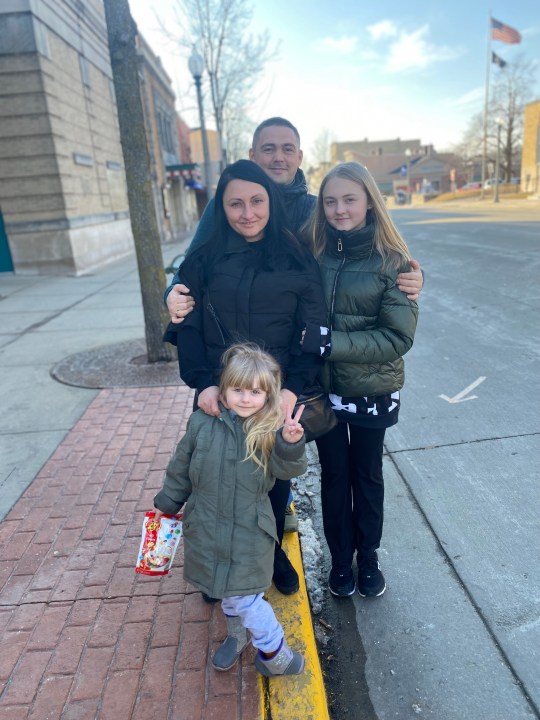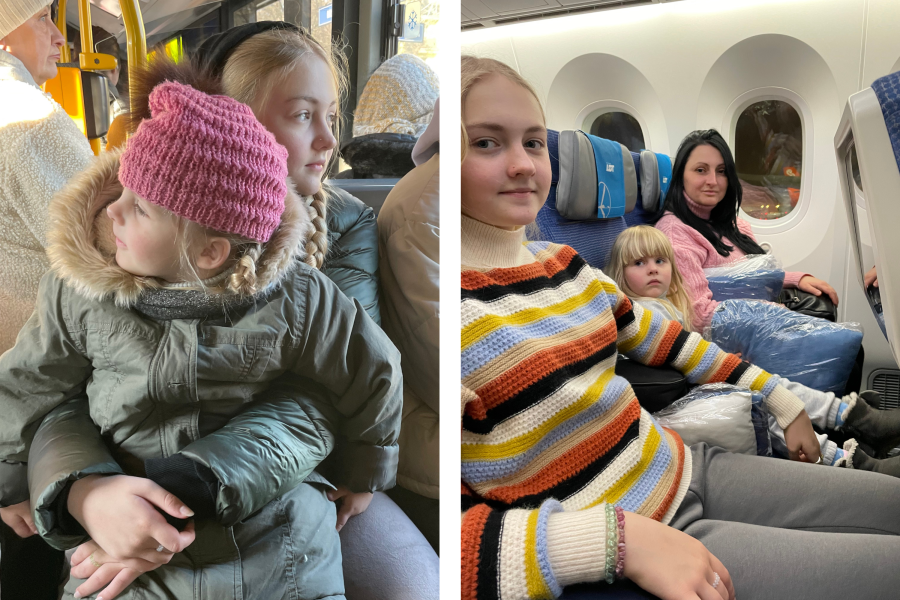From bomb shelter to Wisconsin: A Ukrainian family’s 1-year journey
Testing on staging11
STOUGHTON, Wis. (NewsNation) — A year ago, the Poroshkovs braced for the worst, and they got it.
They were in their 14th floor apartment when they saw a missile fly, impacting a nearby building. As Russian bombs continued to hit Kyiv, the Poroshkovs spent most of their time in a bomb shelter, watching as food supplies dwindled.
Today, however, this family of four is navigating life in small-town Wisconsin.
The Poroshkovs — father Illia, mother Natalia, and daughters Melaniia, 13, and Stefaniia, 4 — are among 110,000 Ukrainian refugees living in the United States as the war in their homeland drags on. They’re working hard to rebuild a life while supporting their countrymen.

Mary Hall/NewsNation
Natalia works at a flower shop. Melaniia is in seventh grade, where she’s enjoying art classes and improving her English by reading fantasy novels. Illia and Stephaniia spend the days at home. Illia is waiting for a work permit, and volunteers his time working to funnel humanitarian aid back to Ukraine. They’re waiting to find an opening in day care for Stephaniia.
“It was difficult to believe that (a stranger) cares about you,” said Natalia, through a translator, while reflecting on how her family got to the United States.
Still, as American support for the war may be waning, these survivors who have come to our country say: Don’t forget us, because the war’s not over yet.
Searching for safety since 2014
The Poroshkovs’ exodus to the United States started, at first, with another escape and a different Russian attack.
In 2014, when Russia attacked Ukraine and annexed Crimea, the family lived in Avdiivka in the Donbas region. More than half of the town was destroyed during the fighting, and it has been under consistent shelling since.
“Our hometown (is in) a real hell. … It was impossible to live in such conditions,” Melaniia said of that time.
If the family had not had a car to escape in, they would likely be dead, Natalia said. They eventually ended up rebuilding in Kyiv, finding a beautiful apartment and starting a trucking business.
Then came 2022. In the lead-up to the attack, Illia and a humanitarian organization he founded began preparing bomb shelters. In the first days of the war, the family made a home there of makeshift cots and bare concrete walls graffitied with smiley faces, hearts and a Ukrainian flag. They only returned to their apartment to change clothes.
Still, many of these war-hardened Ukrainians thought the conflict would end quickly. None imagined it would become the biggest air, sea and ground assault in Europe since World War II.
But as days and weeks turned into months, the Ukrainian army succeeded in holding the country. The impact on civilian life was devastating, Natalia said.

“One of the missiles killed the children of one (neighbor),” she remembered. “She was asking, ‘Why didn’t she leave before?’ … We could tell you more tragedies, but we should probably just stop there.”
Illia spent weeks away from his family, bringing water, food and fuel into the most affected areas.
“The list of what we need to buy to bring (included caskets),” Illia said through a translator. “Some people were buried just in blankets.”
In April of 2022, family friends who had an international business offered to help the family flee to Poland. “This is your last chance to go with us,” Natalia remembers them saying. There was only one bridge left out of the city, and this would be their friends’ last trip. “We had just half an hour to pack up.”
In Poland, friends connected them to North America for Ukraine, which is how Renee Lushaj, who sponsored their journey to Wisconsin, found them.
“We didn’t think about moving to America, because, first of all, we don’t speak the language. It’s far from Ukraine and our parents will not be able to go,” Natalia said through a translator.
Yet while it was scary to trust their children and their futures to strangers on another continent, they were convinced that when Lushaj said they’d be taken care of, she meant it. “We were so amazed at how this group was helping us,” Natalia added.
Finding home (for now)
The idea of home is a cherished yet tricky thing for the Poroshkov family, who today live in a small, two-bedroom apartment furnished and paid for by the Stoughton Resettlement.
Upon entering, visitors are greeted by a large American flag on the wall over the dining table. There’s a nook in one corner filled with a dollhouse and toys for Stefaniia. Comfortable couches are arranged around the TV in the living room, and there’s a small area for an office behind the kitchen.
“All your life you are trying to save money to buy and collect things,” Natalia said. “And later you realize that you don’t need it.”

Still, the family’s status is precarious. They only have one more year left on their humanitarian parole visa, and, unless Congress intervenes, they may have to change countries again. Natalia still has a suitcase packed and tucked away just in case, a remnant of weeks and months when being ready to go saved the lives of the family.
Recent polling says American support for providing aid to Ukraine is dropping. Less than half the country now favors providing weapons. It used to be 60% of the county. And less than 40% support providing funding to the Ukrainian government, according to a poll by The Associated Press-NORC Center for Public Affairs Research.
Yet when asked about the longevity of the war and how public opinion is changing, Illia points back to the state of the people in his hometown, who are still living without water and electricity.
“America has all the resources for this, but (we) need your help,” he said, adding that he remains grateful to the Stoughton community.
“We have in some areas very similar values, like love, freedom. (Our circumstances) are painful, but it’s life,” Illia said. “All (we) want to say (is) just simple thank you. … We’re happy to be here.”
